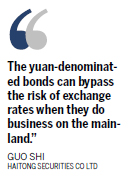Business
McDonald's puts yuan-denominated bonds on its menu
By Wang Chao (China Daily)
Updated: 2010-08-27 17:07
 |
Large Medium Small |
BEIJING - The first yuan-denominated bonds to be launched in Hong Kong by a non-financial company, McDonald's, has had an "overwhelming" response, the fast-food giant said.
Vivian Zhang, public relations manager of McDonald's China, told China Daily the bonds have been "oversubscribed", but would not say who the major buyers are.
Zhang said McDonald's has been trying to launch yuan-denominated bonds since 2005, but it didn't become a serious consideration until February this year when the Chinese government allowed foreign companies to issue such bonds.

On Aug 19, McDonald's launched the 200 million yuan ($29.4 million) bonds in Hong Kong, with Standard Charted PLC, a UK bank, underwriting the deal.
The bonds are designed for institutional and professional investors and will accrue interest at a rate of 3 percent a year and mature in three years.
Before this, only financial institutions issued yuan-denominated bonds, mostly for liquidity and international transactions for multinationals such as McDonald's.
Timothy Fenton, president of McDonald's APMEA (Asia/Pacific, Middle East and Africa), said this is another sign of the company's confidence in its long-term opportunities for China.
"China is the fastest-growing market for McDonald's worldwide in terms of new restaurant openings," he said.
To Guo Shi, senior project manager of the bond department, Haitong Securities Co Ltd, the action is an indication that McDonald's is going to find new financing channels through the yuan. The company raised $750 million in a bond sale in July and compared with that, $29.4 million is small.
"The yuan-denominated bonds can bypass the risk of exchange rates when they do business on the mainland," Guo said. "Since the yuan-denominated bonds interest is much higher than the dollar-denominated bond, McDonald's need to pay more for the interest, but it can save them the trouble of exchanging currencies."
With the bonds, the company can build new channels to directly obtain the yuan, which it can invest into the mainland market.
A McDonald's statement said all the money raised will be used to expand the business on the mainland.
"I bet there would be a second and third launch of yuan-denominated bonds from McDonald's," Guo said.
The mainland has become a growing market for McDonald's this year. Its second quarter financial statement announced on July 23 said the company achieved a global sales growth of 7 percent in July, with a 5.7 percent increase in the US, 5.3 percent in Europe and 10 percent in the APMEA region.
Kenneth Chan, CEO of McDonald's China, said the company plans to continue open and renovate restaurants, and roll out convenience initiatives.
This year, McDonald's has plans for 150 to 175 new restaurants in the country. It has 1,100 restaurants in China and employs more than 60,000 people, but main competitor KFC has more than 3,000 restaurants in 600 cities in China.
Guo said the yuan-denominated bonds can also help banks in Hong Kong expand the variety of their financial products and gain more profit.
Scott Price, Asia chief executive of Walmart Inc, the world's largest retailer, told Bloomberg in March that it was mulling selling yuan bonds in Hong Kong.
However, Jiang Wei, Walmart China's media relation's manager, denied it.
"We don't have such a plan now," she said.
The State Administration of Foreign Exchange and the People's Bank of China, the central bank, eased controls on bonds issued by non-financial foreign companies in February in order to turn the yuan into an international currency like the dollar, euro and yen.
CHINA DAILY